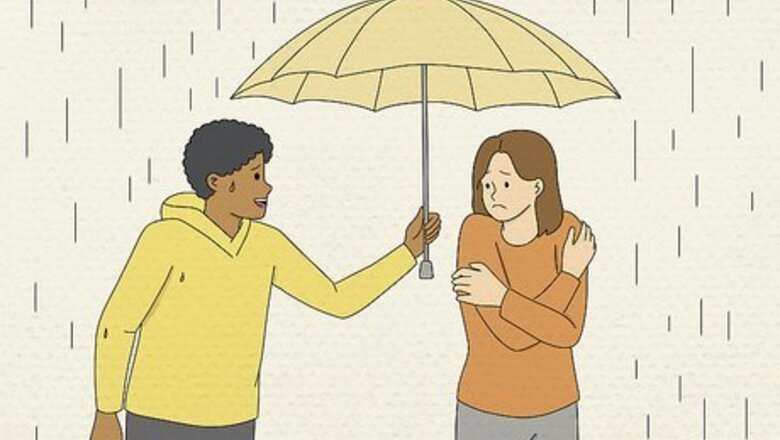
views
- Codependent friendships are unhealthy, one-sided friendships in which one friend acts as a “caretaker” to the other, providing constant emotional support.
- Signs of a codependent friendship include one friend needing constant support or “rescuing,” while the other friend’s needs are neglected or ignored.
- If you’re a codependent friend, practice putting your own needs first. If a friend is codependent on you, encourage them to prioritize their own well-being.
What is a codependent friendship?
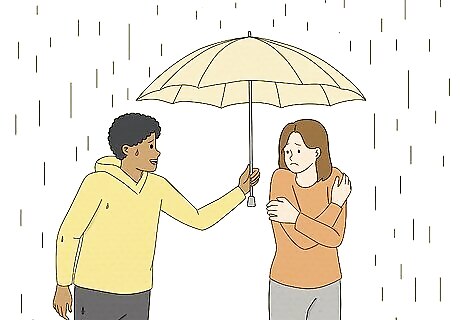
Codependent friendships are overly focused on one person’s needs. One person is often the “giver” who always prioritizes their friend’s needs while neglecting their own. The other person is usually the “taker” who accepts their friend’s help, but doesn’t always offer the same level of support in return. This creates an unbalanced friendship in which one person always takes care of the other. Givers are often codependent people. They tend to struggle with low self-esteem and feel obligated to help or “fix” other people’s problems. While givers can be very compassionate, they may neglect to take care of themselves, instead deriving self-worth from feeling “helpful” or “needed” by others. Takers often struggle to manage their own feelings or fix problems in their lives. They turn to others to “take care” of them, which sometimes enables their bad behavior. Codependency can occur in any type of relationship, including friendships, romantic relationships, professional relationships, and among family members.
Signs of a Codependent Friendship
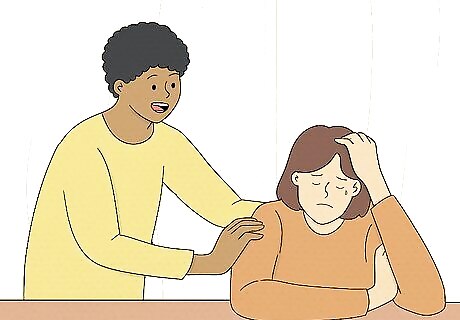
One of you constantly provides the other with emotional support. If one of you feels down, the other is always there to text, call, or talk in-person. Your hangouts feel like therapy sessions. One person does most of the talking, while the other listens or offers suggestions. Meanwhile, the “listener” rarely gets listened to. They may like it that way—but it’s possible that their friend never lets them get a word in.

One person is always “fixing” the other’s problems. When one person has an issue, the other feels obligated to make things better. Maybe one of you frequently lends the other money. Or maybe one of you often lies to the other’s family about where they were the night before. In most cases, the “fixer” doesn’t get the same help in return. They may also neglect to address their own problems because they’re too preoccupied with helping their friend. For instance, they might stay out late helping their friend get home safely from a party, only to feel exhausted the next day at work or school.
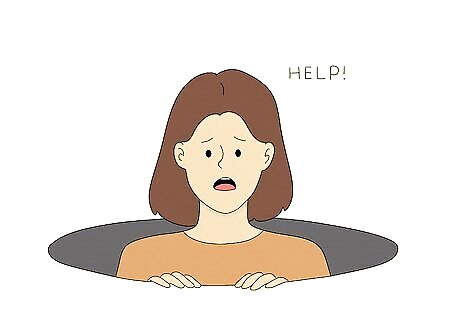
One of you always needs to be helped or rescued. One person is often getting into trouble, going through hard times, or having an experience they can’t handle alone. Maybe they struggle with substance abuse and need help hiding it from their family. Or they’re in an on-again, off-again relationship and often need a shoulder to cry on. Whatever the specifics, the person who needs feels unable to solve their own problems. At the same time, the other person relishes being their friend’s “helper.” They feel appreciated when their friend turns to them for support, even when their friend doesn’t reciprocate.
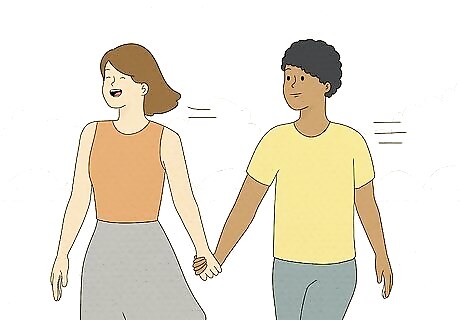
One of you usually goes along with the other’s decisions. One person usually decides where to go, what to do, and who else can tag along. They may act like they’re in charge. Meanwhile, the other friend may have difficulty saying “no,” or their ideas and needs get ignored. Having a dominant personality doesn’t give someone the right to push others’ needs aside. The other friend might also feel obligated to submit to the dominant person’s demands
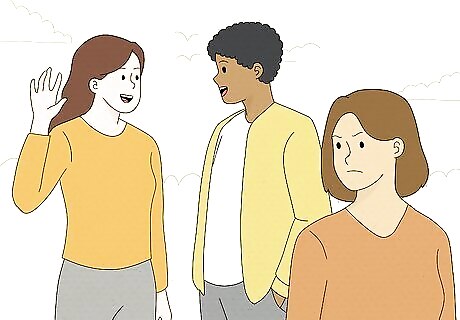
You feel jealous of each other’s friendships. One of both of you might get upset when the other makes friends with new people. You might worry that someone else might replace you as the “giver” in your friend’s life. Or you might get upset seeing your friend become a giver to someone else. You might want them “all to yourself”—not necessarily out of anger, but out of fear of losing them.

You’ve started neglecting other people in your life. You prioritize your friendship at the expense of other connections. Your social lives revolve around each other. Your other friendships may fizzle out, and forming new connections might be difficult. One of you might feel obligated to “choose” your friendship over other relationships.

One friend constantly worries about the other’s opinions of them. One of you often wonders, “Does my friend hate me?” “Did I say something wrong?” “Do they still want to be my friend?” This constant need for reassurance signals that one person’s self-esteem is tethered to the other’s approval. It’s normal to value a friend’s opinions, but needing their constant approval is unhealthy. Likewise, being someone’s main source of self-esteem is problematic.
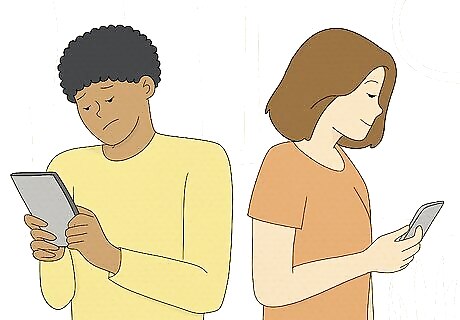
The friendship is burning one (or both) of you out. The frequent texts, video chats, and DMs are taking up all your time. In-person, you two are practically attached at the hip, with one of you always counseling or helping the other. Providing so much emotional support (or needing so much) is becoming exhausting. Burnout out can make you feel resentful towards each other, especially if one or both of you feels neglected or taken advantage of.
How to Be a Less Codependent Friend
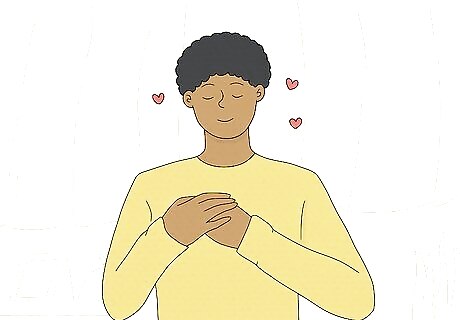
Practice putting yourself first. Take care of your own needs before helping others. Remember that self-worth comes from within, not from being “needed” or “approved of” by others. Keep in mind that everyone is responsible for their own actions and feelings, and that you’re not responsible for fixing other people’s problems. Taking care of yourself can boost your mood and self-esteem. It also helps foster healthy friendships since you’ll be less emotionally dependent on others.
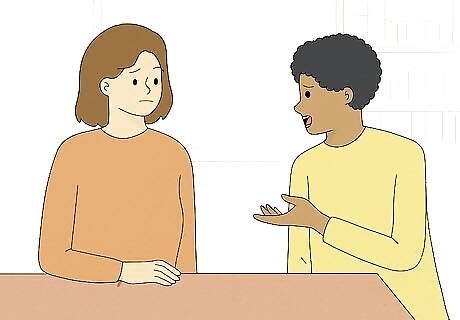
Raise your concerns with your friend if you’re comfortable doing so. Explain that you want a more balanced friendship in which both of you take care of your own needs. Emphasize your own needs and feelings, and explain that you want them to listen and support you as well. Your friend may have difficulty adapting to these changes at first. Give them time to adjust until you’re comfortable with their behavior. If you don’t think they’ll listen, or you’re worried that they’ll respond negatively, consider pulling away from the friendship. This could mean seeing them less often, avoiding certain subjects, or spending more time with other friends.
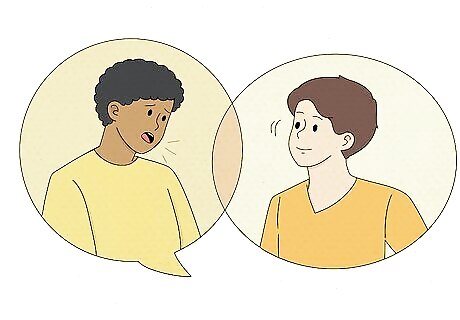
Maintain healthy friendships where everyone gets an equal voice. Choose friends who listen with empathy and are considerate of your needs. Don’t be afraid to offer emotional support now and then, as long as they show you support when you need it too. Remember that you can’t fix everyone’s problems. You can still be a wonderful friend without being someone’s “fixer.”

Practice setting boundaries with your friends. Recognize when people are asking too much of you, and allow yourself to say “No” or “Not now.” Take care of your mental and physical health, and avoid friendships with people who expect you to take care of theirs. Remember that it’s okay to disappoint people sometimes—even your friends. For instance, if a friend often texts you to vent about their problems, you can choose to not respond right away. You can also tell a friend “Sorry, I’m not sure I can help,” or “Can we talk about this another time?”

Consider seeing a therapist to address your codependency. A skilled therapist can help you explore the causes of your codependency, including family dynamics, past trauma, and other factors. They can also help you build self-esteem and develop new, healthier friendships with supportive people. A therapist can also help you address other mental health issues, including depression and anxiety. Dealing with these issues can help you form better relationships in the future.
Helping a Codependent Friend
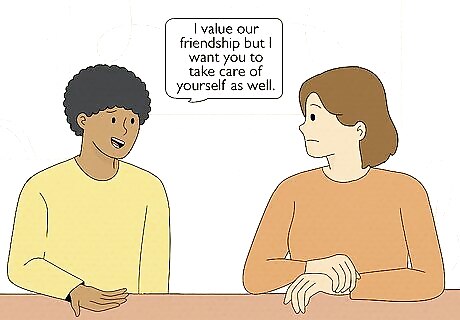
Encourage your friend to prioritize their own needs. Explain that you value their friendship but want them to take care of themself as well. Emphasize that you want to take responsibility for your own problems. Remind them that you know you can count on them, and that you’ll come to them for help when it’s truly needed. You don’t need to distance yourself from your friend, but remember that they may have difficulty adjusting to these new dynamics. Give them time to get used to the change.
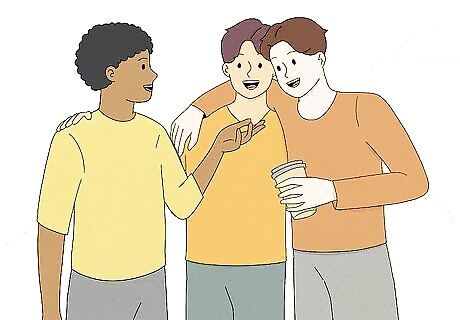
Maintain friendships with other people. Keep in contact with a wide network of people, including old friends and new acquaintances. Listen to others’ needs, but don’t insist on helping if it’s not wanted. Avoid leaning on one person exclusively for emotional support. It’s natural for intensity and intimacy will vary between friendships. Don’t be alarmed if some friends are much more supportive than others.

Practice self-care and emotional independence. Don’t be afraid to reach out to others for support, but remember that your struggles, problems, and crises are your responsibility. Take ownership of your feelings, actions, and mistakes. Engage in positive self-talk when dealing with challenging situations and negative emotions. When in doubt, ask your close friends if you’re being too needy to demanding. Graciously accept their feedback and adjust your behavior accordingly.
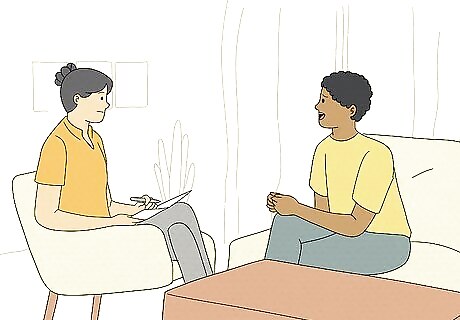
Reach out to the therapist to address your own mental health. In some cases, clinginess and callousness can be caused by trauma. A therapist can help you understand the root causes of your behavior. With their help, you may be able to change your behavior and engage in healthier friendships based on give-and-take. A therapist or counselor can also help you address substance abuse or other issues that may draw codependent friends.
What Healthy Friendships Look Like
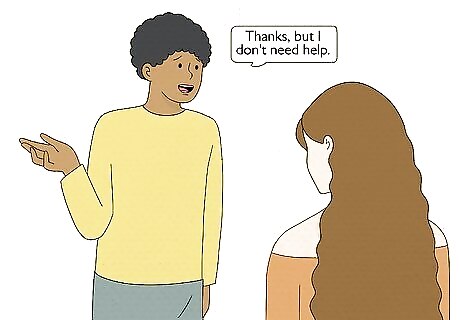
People in healthy friendships respect each other’s needs. They listen to each other, help each other, and give each other space. They may still lean on each other when life gets hard, but they don’t demand constant emotional support. And they’re not afraid to tell each other, “I need some downtime this week,” or “Thanks, but I don’t need help.” Close friends can still be loyal to each other. For instance, they might prioritize spending time together, just as they would for other important people in their lives. Even best friends might feel a little needy or jealous from time to time. But they can process their feelings maturely.
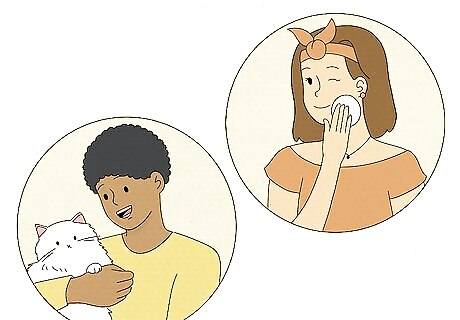
Healthy friendships foster independence. Good friends know they can’t always be the center of attention. They know they each have other friends, family, and important people in their lives. They respect each other’s beliefs, interests, hobbies, and so on. Being independent doesn’t prevent friends from being close. Best friends might be very fond of each other, even if they don’t talk every day. Good friends also respect each other’s time and privacy. They don’t expect an immediate reply to every text or know every detail about each other’s lives.
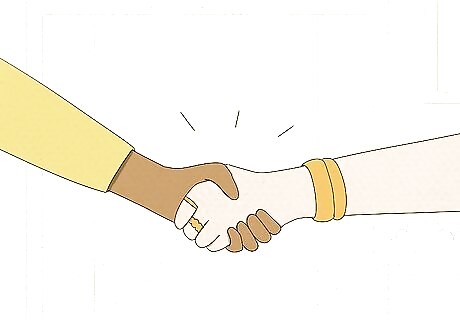
People in healthy friendships resolve conflicts in a mature way. They listen with empathy and try to understand each other’s perspectives. They admit when they’re wrong, apologize when they say something hurtful, and accept each other’s apologies whenever possible. They know their friends aren’t perfect, but they love them anyway. Healthy friendships a built on trust, like any relationship. People who trust each other can work through disagreements and find common ground.




















Comments
0 comment